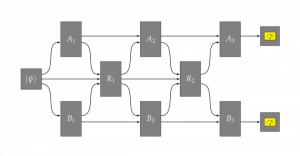Summary
Classical game theory – conducted at the interface between economics and computer science – has found applications in topics ranging from networking and security to online markets. Despite over 20 years of research into connections between game theory and quantum information, we have yet to see any significant implications of quantum information when applied to game theory. This project brings a reformulation of quantum game theory as a mathematical theory of strategic interactions involving quantum information among rational decision-making agents. We focus on computational complexity aspects as a means to redevelop quantum game theory and tackle four challenge areas that include non-interactive games, interactive games, correlated (and entangled) equilibria, and cooperative quantum strategies. This reformulation of quantum game theory holds promise for enabling new mathematical techniques in quantum information science (e.g., communication protocols) and new applications of quantum devices. Finally, as we consider the fundamental aspects of quantum games, we are bound to discover interesting new mathematical structures that may find uses in other areas of quantum information science.

Figure 1. An illustration of a multiple-turn, abstract game involving three agents who exchange and process quantum information.
Related Content

Plasmon Control of Quantum States in Semiconductor Nanocrystals
Summary Thanks to the light-induced collective oscillations of free charges at the boundary between a conducting material and a dielectric, known as surface plasmon resonance, metallic nanostructures can exhibit strong light absorption and scattering. The sensitivity of these resonances to the local environment and shape of the metallic structures allows them to be used, […]
March 21, 2018
Using Interactive Digital Storytelling to Represent Transformative Quantum Technologies in Augmented/Extended Reality Environments
Summary A major roadblock to the broader adoption of quantum technologies is the long learning curve associated with their seemingly abstract concepts. This often renders quantum technologies inaccessible to most audiences, especially through explanations using conventional scientific language. In this project, we develop novel methods of interactive digital storytelling – augmented and extended reality (AR/XR) […]
February 24, 2021

Quantum Information Processing with Molecular Lattices
The aim of the work is to develop theoretical tools to simulate and predict the behaviour of a one-dimensional chain of trapped dipolar molecules and to study the nature of entanglement as a design resource.
June 1, 2017

Enabling Next-Generation Sustainable Computing through Novel Multi-Valued-Logic Quantum Devices
As the demand for digital services grows, so does the need for data centres and transmission networks. Unfortunately, these data systems consume vast amounts of energy, resulting in nearly 1% of all energy-related greenhouse gas emissions. This project aims to invent novel quantum devices for highly energy-efficient computing that may help reduce the global digital […]
June 12, 2023

